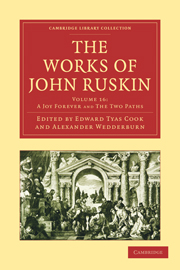Book contents
- Frontmatter
- Contents
- LIST OF ILLUSTRATIONS
- INTRODUCTION TO THIS VOLUME
- PART I “A JOY FOR EVER” BEING THE SUBSTANCE (WITH ADDITIONS) OF TWO LECTURES ON THE POLITICAL ECONOMY OF ART (1857, 1880)
- PART II INAUGURAL ADDRESS AT THE CAMBRIDGE SCHOOL OF ART (1858)
- PART III THE OXFORD MUSEUM (1858, 1859)
- PART IV “THE TWO PATHS” (1859)
- APPENDIX: ADDRESSES AND LETTERS 1856–1860
- I REMARKS ON THE RECENT PROGRESS OF DESIGN AS APPLIED TO MANUFACTURE (MARCH 12, 1856)
- II AN ADDRESS TO THE WORKMEN EMPLOYED ON THE OXFORD MUSEUM (APRIL 18, 1856)
- III THE VALUE OF DRAWING: ADDRESS TO THE ST. MARTIN'S SCHOOL OF ART (APRIL 3, 1857)
- IV THE PRESERVATION OF ITALIAN PICTURES: REMARKS AT A MEETING OF THE ARUNDEL SOCIETY (JUNE 25, 1857)
- V THE ARTS AS A BRANCH OF EDUCATION: A LETTER TO THE REV. F. TEMPLE (SEPTEMBER 27, 1857)
- VI THE STUDY OF ART: ADDRESS TO THE ST. MARTIN'S SCHOOL OF ART (APRIL 16, 1858)
- VII VENETIAN ARCHITECTURE: REMARKS MADE AT A MEETING OF THE ARCHITECTURAL PHOTOGRAPHIC SOCIETY (FEBRUARY 15, 1859)
- VIII RELIGIOUS ART: REMARKS MADE AT A MEETING OF THE WORKING MEN'S COLLEGE (MARCH 8, 1860)
- IX EVIDENCE GIVEN BEFORE THE SELECT COMMITTEE ON PUBLIC INSTITUTIONS (MARCH 20, 1860)
- Plate section
V - THE ARTS AS A BRANCH OF EDUCATION: A LETTER TO THE REV. F. TEMPLE (SEPTEMBER 27, 1857)
Published online by Cambridge University Press: 07 September 2011
- Frontmatter
- Contents
- LIST OF ILLUSTRATIONS
- INTRODUCTION TO THIS VOLUME
- PART I “A JOY FOR EVER” BEING THE SUBSTANCE (WITH ADDITIONS) OF TWO LECTURES ON THE POLITICAL ECONOMY OF ART (1857, 1880)
- PART II INAUGURAL ADDRESS AT THE CAMBRIDGE SCHOOL OF ART (1858)
- PART III THE OXFORD MUSEUM (1858, 1859)
- PART IV “THE TWO PATHS” (1859)
- APPENDIX: ADDRESSES AND LETTERS 1856–1860
- I REMARKS ON THE RECENT PROGRESS OF DESIGN AS APPLIED TO MANUFACTURE (MARCH 12, 1856)
- II AN ADDRESS TO THE WORKMEN EMPLOYED ON THE OXFORD MUSEUM (APRIL 18, 1856)
- III THE VALUE OF DRAWING: ADDRESS TO THE ST. MARTIN'S SCHOOL OF ART (APRIL 3, 1857)
- IV THE PRESERVATION OF ITALIAN PICTURES: REMARKS AT A MEETING OF THE ARUNDEL SOCIETY (JUNE 25, 1857)
- V THE ARTS AS A BRANCH OF EDUCATION: A LETTER TO THE REV. F. TEMPLE (SEPTEMBER 27, 1857)
- VI THE STUDY OF ART: ADDRESS TO THE ST. MARTIN'S SCHOOL OF ART (APRIL 16, 1858)
- VII VENETIAN ARCHITECTURE: REMARKS MADE AT A MEETING OF THE ARCHITECTURAL PHOTOGRAPHIC SOCIETY (FEBRUARY 15, 1859)
- VIII RELIGIOUS ART: REMARKS MADE AT A MEETING OF THE WORKING MEN'S COLLEGE (MARCH 8, 1860)
- IX EVIDENCE GIVEN BEFORE THE SELECT COMMITTEE ON PUBLIC INSTITUTIONS (MARCH 20, 1860)
- Plate section
Summary
My dear Sir,—I have just received your most interesting letter, and will try to answer as shortly as I can, saying nothing of what I feel, and what you must well know I should feel, respecting the difficulty of the questions and their importance; except only this, that I should not have had the boldness to answer your letter by return of post, unless, in consequence of conversations on this subject with Mr. Acland and Dr. Acland, two months ago, I had been lately thinking of it more than of any other.
Your questions fall under two heads: (1) The range which an art examination can take. (2) The connection in which it should be placed with other examinations.
I think the art examination should have three objects:
(1) To put the happiness and knowledge which the study of art conveys within the conception of the youth, so that he may in after-life pursue them, if he has the gift.
(2) To enforce, as far as possible, such knowledge of art among those who are likely to become its patrons, or the guardians of its works, as may enable them usefully to fulfil those duties.
(3) To distinguish pre-eminent gift for the production of works of art, so as to get hold of all the good artistical faculty born in the country, and leave no Giotto lost among hill-shepherds.
In order to accomplish the first object, I think that, according to Mr. Acland's proposal, preliminary knowledge of drawing and music should be asked for, in connexion with writing and arithmetic; but not, in the preliminary examination, made to count towards distinction in other schools.
- Type
- Chapter
- Information
- The Works of John Ruskin , pp. 449 - 454Publisher: Cambridge University PressPrint publication year: 2010First published in: 1905



